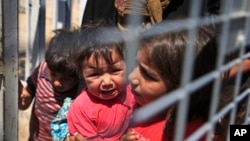The United Nations called attention Thursday to the effects that conflicts in the Middle East and North Africa are having on education, with more than 13 million children in nine countries not attending school because of the fighting.
A UNICEF report said violence in the region has reached "new levels of destructiveness and horror" as kids are increasingly being exploited. It cited multiple factors that prevent children from attending classes, including attacks that damage or destroy schools, refugees and combatants using the buildings as shelter, and parents deciding to keep kids at home because the route to school is too dangerous.
The report included Syria, Iraq, Yemen, Libya, Sudan, Jordan, Lebanon, Turkey and the Palestinian territories. It warned that with 40 percent of school-aged kids in those areas not going to class, "the educational prospects of a generation of children are in the balance."
"Conflicts wipe out years of investment and achievements in education and can cripple the development of education systems," UNICEF's Regional Director in the Middle East and North Africa Peter Salama said.
"The effect of violence and insecurity in Iraq and Yemen is clear, as educational achievements for children have fallen steadily. In countries like Syria, the conflict has reversed more than two decades of expansion of access to education."
Diminished education
The children who do make it to school face a diminished education due to what UNICEF said is a lack of qualified teachers in places like Sudan and Yemen, as well as an overall teacher shortage elsewhere because of those who abandoned their posts after being detained, intimidated or attacked.
The situation includes not only challenges inside war-torn countries, but also in neighboring nations that have taken in millions of refugees. The host countries face the strain of trying to accommodate so many extra kids into their education systems, while refugee children have to deal the challenge of adapting to a new curriculum and even new languages in order to learn.
UNICEF also stressed the emotional toll that growing up in conflict places on kids and the potential negative effects that has on their education.
"The forces that are crushing individual lives and futures are also destroying the prospects for an entire region," the report said. "Young minds distorted by hatred and fear will need extraordinary support to contribute fully to the development of societies built on social progress, tolerance and prosperity."
UNICEF urged the world to prioritize education funding during emergencies and boost overall donations to help alleviate schooling challenges in those countries. It also said children should be given more access to informal education services such as allowing them to study at home or through online programs if possible.
The report's recommendations also included renewed calls for the parties involved in conflicts to stop attacks on education facilities, which have left thousands of schools damaged or destroyed.





